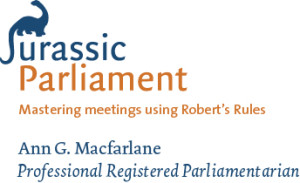Cheat sheet for the chair

I gave one to a senior elected official this week. He read the first line and said, half-joking, “the servant of the group, not the boss?! That can’t be right. I always say, ‘Lead, follow, or get out of the way.’”
How about you, gentle reader? How do you like to run your meetings? Are you the servant of the group or the commanding officer?
If our approach works for you, give us your postal address and I’ll send your personal copy of our “cheat sheet” on lovely cardstock. Or use this blog’s nifty “print” feature to print out a copy today for your wallet or purse.
CHEAT SHEET FOR THE CHAIR
To run fair, efficient and democratic meetings:
- Control the meeting as servant of the group, not “boss.”
- Control who speaks by “recognizing” members.
- Discussion is not a conversation. Don’t allow anyone to speak a second time until all who wish have spoken.
- Help everyone focus on the meeting’s purpose by keeping discussion “germane” (relevant).
- Model and insist on courtesy and respect.
- Teach members to use “point of order” and to “appeal” your decisions.
- Listen to each person speaking as if there were no one else in the room.
- Keep an emotional connection with the members.
- When in doubt, ask the group! The group is the final authority.


How do you handle a Chair (Mayor) who won’t acknowledge multiple requests of points of order, won’t control public comment speakers who call council members out and point fingers (literally) and proceeds to berate the Council members himself?
Cris, the mayor is the servant of the group and the group is the final authority. You can read in Robert’s Rules of Order Newly Revised 11th edition how to respond – see pp. 650-651. Good luck!